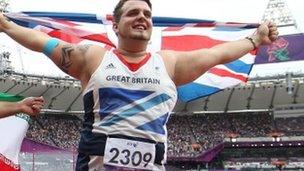Disability Sport Wales: Record number playing, figures show
- Published

Paralympian discus champ Aled Davies has said he would like to compete against able-bodied athletes
More disabled people in Wales are taking part in sport than ever, according to new figures.
Grassroots investment is credited with the boost along with the Paralympic legacy, says Disability Sport Wales (DSW).
It says that the challenge now is for disabled people to be included in mainstream sport.
The figures were released as 600 people take part in the 10th annual Wheelchair Sport Spectacular in Cardiff.
DSW executive director Jon Morgan said he welcomed the rise in figures, which had been a trend for the past 10 years.
But he said more needed to be done with the "insport" programme to include disabled sportspeople in the mainstream.
"Our biggest challenge in sports per se, not just disability sports, is to be more inclusive so that disabled people can take part in mainstream clubs," he said.
Mainstream clubs are being offered the education and support needed to allow this to happen, he said.
"[The idea is that] if a disabled person in rural Carmarthenshire wants to play squash he or she can rock up to the local club and say 'I'm in a wheelchair but I can play squash', and the club can help."
"In Neath Port Talbot we have the Tata Steel sailing club which has 26 disabled people, in Conwy we have the Dolphins water polo club with 14 integrated members and in Powys the Maldwyn Dragons gymnastics has 20 integrated members," he said.
Development officers
"There are other sports too, and in Cardiff the St Patrick's karate club has 35 disabled members and the Rhondda Cynon Taf Gelli Galed bowling club has 43 integrated members, so things are moving in the right way."
A Welsh government-funded programme placed disability sport development officers in each of the 22 Welsh local authorities in 2000.
Sports Minister John Griffiths said: "The Welsh government fully recognises the valuable contribution that sport and physical activity can make to our health and I hope that the number of disability sport clubs and participation opportunities continues to increase."
Sport Wales chair Laura McAllister said the increase in participation was something to be expected after the Olympics and Paralympics, but in Wales there had been a move over 10 years to build the infrastructure for this to take place.
"I travel to different countries and I am always asked about our record in disability sport and how we punch above our weight as a nation on the elite world stage.
"One of the reasons is our investment at the very grassroots to enable all people, regardless of their disability, to take part in sport," she added.
- Published13 December 2012
- Published10 April 2013
- Published26 September 2012
- Published9 September 2012
- Published2 September 2012